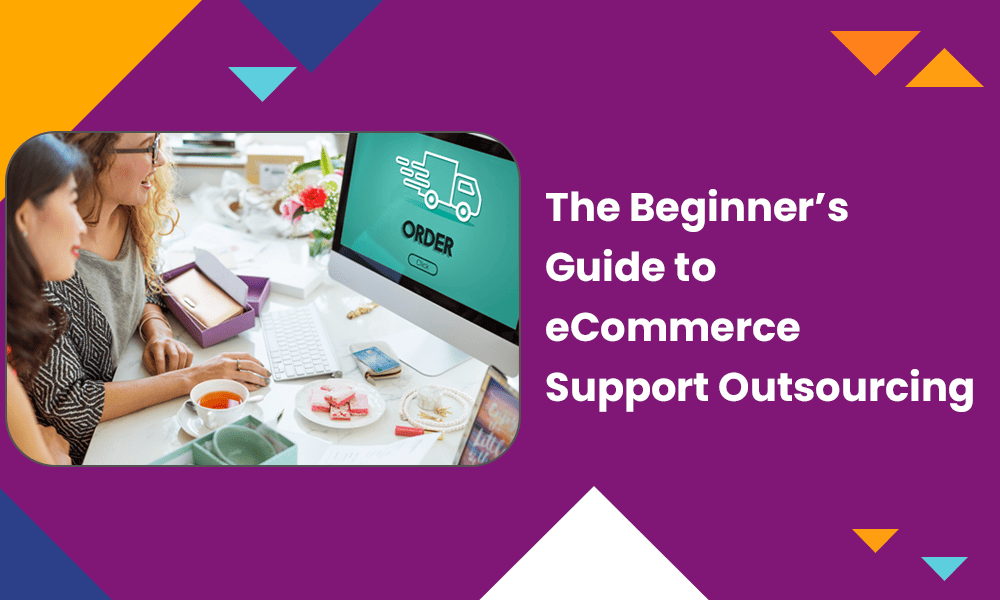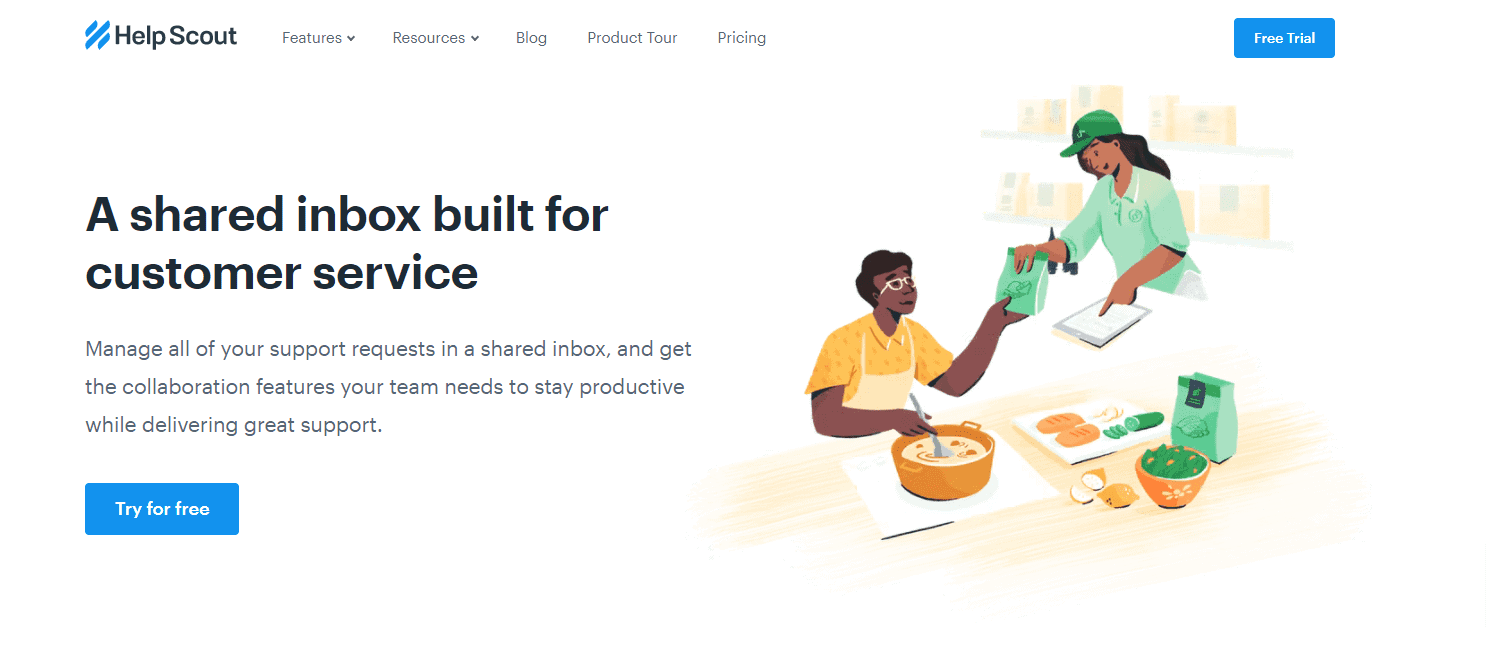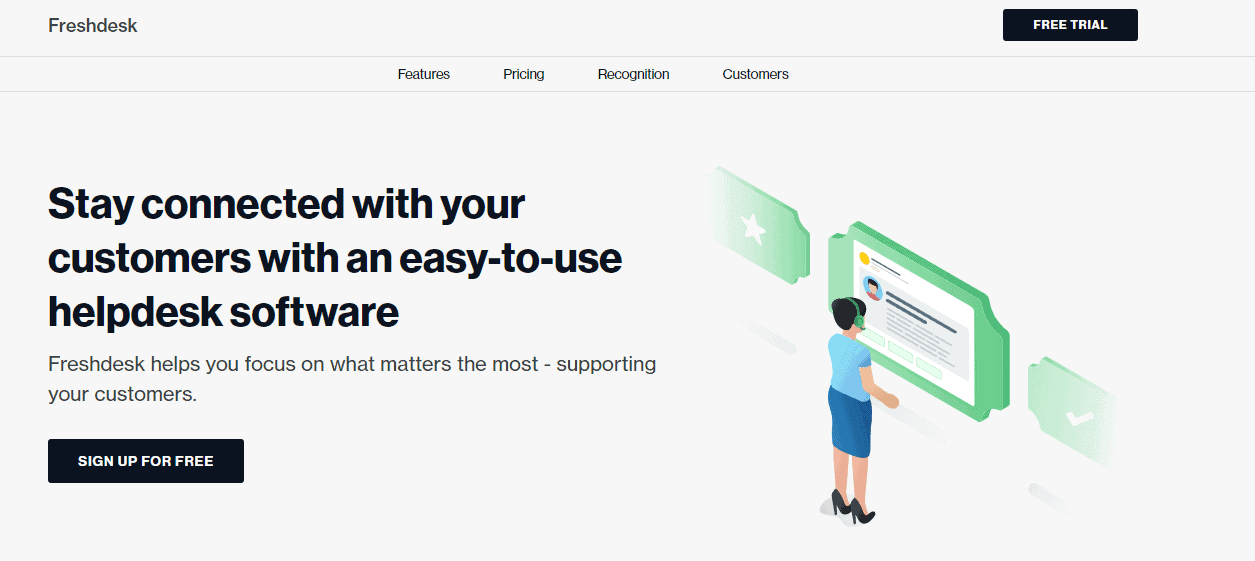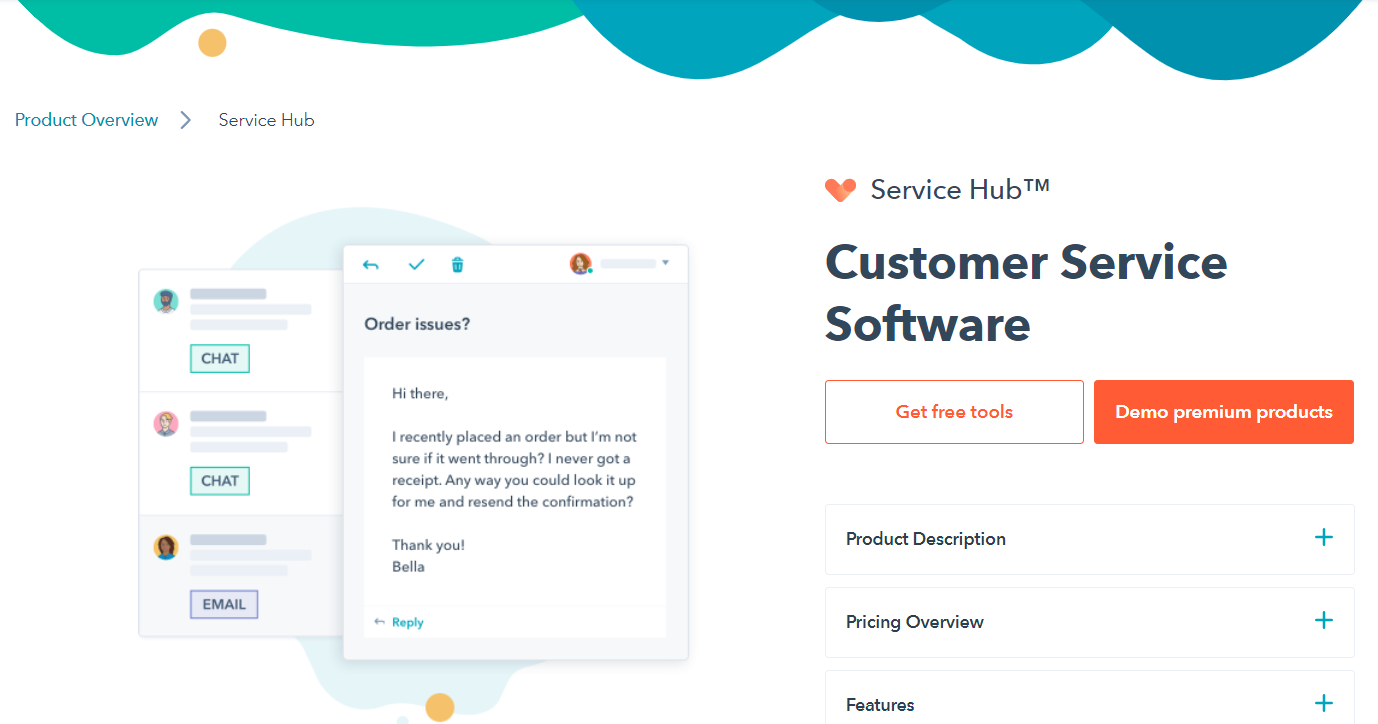This guide to eCommerce support outsourcing will provide all the information you need before finalizing your vendors and partners. We’ll discuss what support outsourcing entails, including how it works and its benefits and challenges.
We’ll also recommend the best eCommerce support software tools to ensure great service.
Let’s get started.
Table of Contents
What Is eCommerce Support Outsourcing?
eCommerce support outsourcing relies on a third-party service or company to fulfill customer care requirements. Outsourcing is incredibly common, with Small Biz Genius estimating that at least 300,000 positions are outsourced annually.
Your business can outsource some of its responsibilities to third parties or relinquish the entire supply chain, depending on the available manpower and funding. If you hire third parties for specific tasks, some examples can include customer service and website development.
Other jobs or roles you can consider outsourcing are:
- Telemarketing
- Technical support
- IT support
- Software development
- Digital Marketing
- Advertising
- Sales support
- Bookkeeping
- Accounting
When Does eCommerce Support Outsourcing Make Sense?
Deciding when to outsource eCommerce tasks is a critical moment. Here are some scenarios in which outsourcing makes sense.
You’re eager to save money
We’ll talk more about the benefits of eCommerce support outsourcing later, but one of the top advantages is the possibility of saving money. Outsourcing can help your business reduce costs, increasing your profit margin until your products and services begin earning more.
You lack the expertise
If you don’t understand a critical eCommerce task, you have two options: learn or defer. You might decide to defer until your busy business staff has more time to learn or possibly defer indefinitely through outsourcing.
You don’t have enough staff
You must make quick decisions when manpower runs thin. You’ll recall from our post on eCommerce fulfillment support that the turnover rate in eCommerce businesses is already higher than usual.
You must be more diligent in retaining your employees, and part of doing that is preventing burnout from overworking. Outsourcing tasks will reduce the responsibilities of your employees, so they might decide to continue working for you.
Read also: eCommerce Customer Expectations: The Science of Delight
Key Steps In eCommerce Support Outsourcing
Before determining whether eCommerce support outsourcing is the right choice to elevate your customer service, don’t miss this overview of how it works.
Decide your business goals
What does your company wish to achieve in the coming months or quarter? How likely are you to meet your goals as projected? How would outsourcing put you closer to your goals?
Depending on how you answer, your business may not be the best candidate for outsourcing right now, as you might not need outsourcing until you grow further.
Determine the level of outsourcing required
If you’ve decided your business is a good candidate for eCommerce support outsourcing, the next step is to determine how much is appropriate.
Do you plan to outsource half of your entire supply chain, or less than half? If so, precisely which tasks do you need to be outsourced, or is it only a matter of additional manpower? You must answer these questions before proceeding.
Set a budget
Next, calculate what your company can afford to spend on outsourced services. You will save money compared to hiring additional staff and purchasing or lending extra equipment, but eCommerce support outsourcing isn’t free.
Select a company or service
The hardest step is choosing an eCommerce support outsourcing service or company. Here are some factors to keep in mind as you research your options:
- Pricing and how well it fits into your budget
- Features or services offered
- Customer service reputation
- Reviews and ratings
Your search for a service provider might include interviews, especially if you’re hiring a service instead of using a software solution. In the latter case, you’d try out free trials and choose a winning software option from there.
When interviewing eCommerce support providers, ask them about their experience, services, pricing, availability, accountability and transparency, communication methods, and customer care.
Read also: 23 eCommerce Customer Support Case Studies for Small Businesses
Flesh out a contract
You will sign a contract when you choose the ideal eCommerce support outsourcing service. Review the terms and consider hiring a lawyer to review the material, especially if entering a vendor or partner agreement.
The terms should be fair to both parties, so don’t sign until you feel well-represented.
Monitor the service provided
From that point forward, the service provider will begin carrying out the tasks you two discussed and detailed in your contract. Monitor them as you would any employee to ensure the quality of the work provided.
Amend as needed
You might have questions or comments for your customer support team or other outsourced staff. They’re here to serve you and can only do a good job if they know what you want. Constructive criticism is allowed.
Read also: eCommerce In-house Support: Pros and Cons Explained
What Are the Benefits of eCommerce Support Outsourcing?
Why do so many businesses opt for customer support outsourcing? Here are some of the perks eCommerce businesses can enjoy.
Cost savings
According to a 2023 LinkedIn article, eCommerce businesses outsourcing customer service can reduce operational expenses by up to 60 percent.
Think of what a substantial difference saving 60% could make for your business, especially if you’re a young startup still gaining your footing.
The money you save can be used to develop new products and services, expand your marketing and advertising campaigns, train your staff, or improve the cash balance. Having more funds in your company’s pocket will expand growth and bolster a stronger future.
More time
eCommerce employees pressed for time will appreciate the reduced workload that outsourcing brings. You won’t have stripped your staff of tasks to the degree that they have nothing to do, but they’ll find their workload more reasonable.
The additional time could allow you to expand your employees’ tasks in other ways or give them ample time to concentrate on the responsibilities before them.
Improved productivity
Being busy does not necessarily mean being productive. An overworked employee will likely get bogged down with stress and be unable to concentrate and thrive.
By comparison, outsourcing your eCommerce tasks to support staff allows your employees to work more efficiently, which benefits your business as a whole.
Reduced strain on staff
Recalling the high rate of eCommerce employee turnover, business owners must strive to do their part to maintain employee morale. Otherwise, you’ll hire new faces frequently to make up for those who have left.
Outsourcing keeps your employee workload manageable and reduces the urge to quit.
Better security
As your eCommerce support outsourcing expands your business globally, you can add more payment options to support various currencies and cards using secure payment gateways.
This will increase customer trust and satisfaction.
Scalability
A mounting staff grows your eCommerce business presence. You can go from the small fish in the pond to one of the biggest global forces by outsourcing more jobs and growing your staff.
Better customer service
Most importantly, you can improve customer service and satisfaction through outsourcing eCommerce support. You’ll have readily available staff in various time zones to assist your customers.
Improving your payment security, utilizing more payment options, and having the reach to connect with customers all over the world will also strengthen customer relationships.
Read also: eCommerce Customer Service Skills: The Fast Track to Customer Happiness
What Are the Challenges of eCommerce Support Outsourcing?
While outsourcing eCommerce roles might seem the answer to your customer support challenges, don’t jump to conclusions.
Outsourcing customer support has its challenges. You must be fully aware of these issues and determine solutions for overcoming them before you begin outsourcing tasks like live chat, social media posts, and more.
Security breaches
Security breaches can befall any company, even those you’ve outsourced eCommerce support tasks to. Their breach can reflect on your company if proprietary or customer data leaks.
You’d have to apologize to your customers and explain what caused the data breach. We recommend adding a security provision to your contract and ensuring your partner reads, understands, and approves it.
You might also request that all third-party partners use cyber security tools like VPN to ensure secure data access and retrieval.
24/7 availability
Companies never shut down in the eyes of most consumers, not even on nights, weekends, and holidays. Growing your presence worldwide through outsourcing helps you expand to more time zones, but you must double-check you have all bases covered, so to speak.
In other words, you must have staff for all time zones so your business doesn’t lapse in providing service. You can ascertain as much by asking questions when interviewing potential partners and doing your due diligence in the research phase.
Slow response times
What is the turnaround time on an average project by your third-party partner? You must know before you begin working together. You might have two very different ideas of a fast turnaround time versus your partner.
In a scenario like that, their taking their time can impact your bottom line as tasks don’t get completed on time, and you drag further and further behind.
The best way to prevent these kinds of issues is to be upfront about your average turnaround times and what you expect of your partner before you begin working together.
Do not contract with a vendor or partner who cannot keep up with your business demands. The perpetual slowdowns will erode customer trust and degrade your reputation.
Another way to prevent slow response times is to create clear and open lines of communication between you and the support staff so you can always get in touch with someone to expedite customer issues.
Language Barriers

Outsourcing eCommerce support means working with partners from all over the world. That creates the potential for language barriers.
If you can’t communicate with your partner, you can’t fully express your business needs and have them met. Communication difficulties can arise between the support staff and your customers, which comes back to you.
Frustrated customers who can’t communicate with your support staff or get the answers they seek might decide to stop doing business with you. They could also begin posting negatively about you, further harming your reputation. You must share a common language with your support staff no matter where in the world they’re based.
They should communicate in the language your customers do and understand fully to ensure your support staff comprehends customer concerns and can address them swiftly.
In addition to the previously mentioned sectors, unified communications for businesses have evolved as a strategic asset. It involves harmonizing various communication tools email, VoIP solutions, and instant messaging for enhanced operational clarity and collaboration across teams.
Excess layers of management
Another potential issue that can arise from outsourcing eCommerce responsibilities is the rise of too many management layers.
The outsourced staff will have its own leadership positions, and yours. Differences in a business hierarchy can lead to stubbornly butting heads over what should be straightforward manners. The only losers in this scenario are your customers, as they don’t get the level of support they need in a timely manner.
You must reestablish the current hierarchy once your eCommerce company begins outsourcing work. Leadership roles may grow, but the order of operations won’t be identical to before you outsourced.
Low-quality documentation
The last challenge associated with eCommerce support outsourcing is low-quality documentation. Failing to document processes can allow the support staff to eschew responsibility later.
Before you begin working with outsourced customer service, review their processes with them. If something is unclear, make sure you mention it so you have a full understanding of what to expect from your new partner.
Read also: eCommerce Support Team Training – All Your Questions Answered
The 5 Best eCommerce Support Solutions
Which service providers should you consider as you outsource eCommerce support? Here are five options to explore.
1. Help Scout
Offering live chat, help centers, and a shared inbox, Help Scout unifies customer conversations for greater sales, marketing, and support team accessibility.
Collaborating and organizing is easy with this tool, including in-app messaging, customer data, and data reporting. The integrations available allow you to incorporate Help Scout into any existing workflow.
Help Scout pricing starts at $20 per user per month for the Standard plan, $40 per user per month for the Plus plan, and $65 per user per month for the Pro plan when you select annual billing.
The Standard plan comes with what you need to get started, including more than 100 integrations, surveys, in-app messaging, a knowledge base, a live chat mailbox, and an email mailbox.
The Plus plan adds advanced permissions, custom teams, 25 users, custom fields, and five mailboxes with social channels.
The Pro plan for big teams adds a dedicated account manager, 50 users, 10 knowledge bases, and 25 mailboxes.
2. Freshdesk
The customer service tool Freshdesk is designed to scale up your support without spending a fortune.
This Freshworks software includes features like a shared teams inbox, agent collision detection to prevent overlaps, a ticket field suggester, collaborator settings, time-triggered and event-triggered automation, and a chatbot that utilizes Freddy AI.
The Free plan is $0 and comes with 24/7 email support, team collaborations, reporting and analytics, a knowledge base, ticket dispatching, and integrated social media and email ticketing.
The Growth plan is $15 per user per month with annual billing and adds custom SSL, custom track fields, custom email server, more than 1,000 marketplace apps, collision detection, and automation.
The Pro plan for $49 per user per month has 5,000 collaborators, custom roles, custom dashboards and reports, custom segmentation, community forums, and custom metrics.
For $579 per user per month, the Enterprise plan includes Freddy assist bot, email bot, auto-triage, and article suggesters.
3. HubSpot Service Hub
Harness the power of HubSpot with its Service Hub software, which caters to customer service providers. You can link the Service Hub to HubSpot’s CRM or use it solo to drive results.
The available features are playbooks, customer portals, custom surveys and feedback, a knowledge base, service automation, and a shared inbox.
Choose from four pricing plans: Free for $0, Starter for $45 a month, Professional for $450 a month, or Enterprise for $1,200 a month.
4. Zendesk
Strengthen customer relationships with Zendesk, a tool for better flexibility and scaling. Utilize tools like in-app messaging, automation, AI, and a help center. You can expect solutions like ticketing, message personalization, an agent workspace for storing customer data, and voice.
Zendesk offers intelligence and routing for tickets, analytics and reporting, and many integrations.
The Suite Team for $55 per user per month with annual billing includes features such as a help center, ticketing system, prebuilt analytics, more than 1,000 integrations, online support, standard bots, and a help center.
The Suite Growth plan costs $89 per user per month and adds SLAs, a self-service customer portal, and business hours.
For $115, the Suite Professional plan–Zendesk’s most popular–includes skill-based routing, data location options, side conversations, custom analytics, and live analytics.
The Suite Enterprise plan has custom pricing and adds contextual workspaces, custom agent roles, content blocks, Content Cues with AI, and a sandbox.
5. Kustomer
The customer support software Kustomer includes customer and self-service solutions for eCommerce and retail businesses. Its customer service tools include CRM chatbots, voice and SMS, forms, emails, and social messaging.
Allow customers to help themselves using Kustomer’s knowledge base builder, which is even SEO-optimized.
Kustomer only offers two pricing plans, Enterprise for $89 per user per month and Ultimate for $139 per user per month.
The Enterprise plan includes multiple language and brand support, conditional fields, multiple business hours, custom permissions, extended API limit, a knowledge base customer portal, proactive chat, service-level agreements, and custom skill routing.
The Ultimate plan comes jam-packed with everything above, plus sandbox access, allowed IP ranges, extended API limit, live agent auditing, enhanced routing, unlimited collaboration users, and real-time dashboards.
Read also: ECommerce Support Guide: The Types And Strategies That Matter
Bottom Line
eCommerce support outsourcing can be a transformative option. You can reduce your spending yet still accrue the manpower needed to take your company to the next level. Outsourcing also allows you to provide better customer service and grow your business globally.
While outsourcing customer support has its downsides, many can be overcome with clear communication and foresight before working together.





